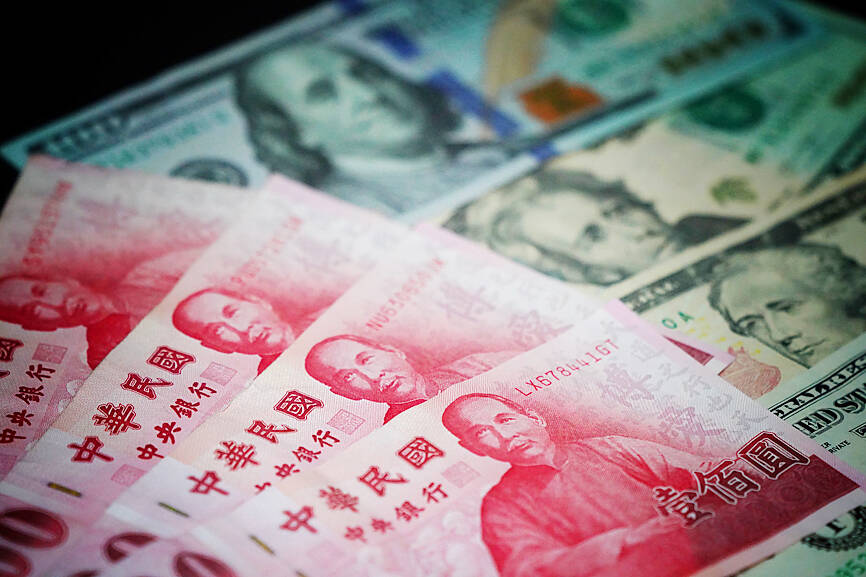The nation’s foreign exchange reserves last month grew US$1.91 billion to a record US$560.28 billion, as the US dollar weakened after the collapses of US regional banks and Switzerland’s Credit Suisse Group AG, boosting the value of assets in other currencies, the central bank said yesterday.
The currency movements were related to market expectations that the US Federal Reserve would raise its policy rate one more time before its pauses tightening to help support the economy and financial stability, Department of Foreign Exchange Director-General Eugene Tsai (蔡炯民) told an online news conference.
The US dollar is unlikely to appreciate, as recession concerns deepen following a series of bank failures caused in part by drastic interest rate hikes that are weighing on bonds and securities held by financial institutions.

Photo: CNA
The Fed has since introduced temporary and selective easing measures to avoid a credit crunch.
The trend could explain why the British pound advanced 3.11 percent against the US dollar, the Euro rose 2.91 percent, the yuan increased 1.08 percent and the New Taiwan dollar gained 0.09 percent, Tsai said.
Taiwan’s foreign exchange market was relatively quiet, with less need for interventions, he said.
Foreign portfolio managers remitted US$3.79 billion of principal, but wired a similar amount of profit abroad, Tsai said.
The central bank’s management also helped shore up a foreign exchange reserve balance that gave Taiwan the fourth-highest ranking after China, Japan and Switzerland, Tsai said.

Three experts in the high technology industry have said that US President Donald Trump’s pledge to impose higher tariffs on Taiwanese semiconductors is part of an effort to force Taiwan Semiconductor Manufacturing Co (TSMC, 台積電) to the negotiating table. In a speech to Republicans on Jan. 27, Trump said he intends to impose tariffs on Taiwan to bring chip production to the US. “The incentive is going to be they’re not going to want to pay a 25, 50 or even a 100 percent tax,” he said. Darson Chiu (邱達生), an economics professor at Taichung-based Tunghai University and director-general of

‘LEGACY CHIPS’: Chinese companies have dramatically increased mature chip production capacity, but the West’s drive for secure supply chains offers a lifeline for Taiwan When Powerchip Technology Corp (力晶科技) entered a deal with the eastern Chinese city of Hefei in 2015 to set up a new chip foundry, it hoped the move would help provide better access to the promising Chinese market. However, nine years later, that Chinese foundry, Nexchip Semiconductor Corp (合晶集成), has become one of its biggest rivals in the legacy chip space, leveraging steep discounts after Beijing’s localization call forced Powerchip to give up the once-lucrative business making integrated circuits for Chinese flat panels. Nexchip is among Chinese foundries quickly winning market share in the crucial US$56.3 billion industry of so-called legacy

Hon Hai Precision Industry Co (鴻海精密) is reportedly making another pass at Nissan Motor Co, as the Japanese automaker's tie-up with Honda Motor Co falls apart. Nissan shares rose as much as 6 percent after Taiwan’s Central News Agency reported that Hon Hai chairman Young Liu (劉揚偉) instructed former Nissan executive Jun Seki to connect with French carmaker Renault SA, which holds about 36 percent of Nissan’s stock. Hon Hai, the Taiwanese iPhone-maker also known as Foxconn Technology Group (富士康科技集團), was exploring an investment or buyout of Nissan last year, but backed off in December after the Japanese carmaker penned a deal

WASHINGTON POLICY: Tariffs of 10 percent or more and other new costs are tipped to hit shipments of small parcels, cutting export growth by 1.3 percentage points The decision by US President Donald Trump to ban Chinese companies from using a US tariff loophole would hit tens of billions of dollars of trade and reduce China’s economic growth this year, according to new estimates by economists at Nomura Holdings Inc. According to Nomura’s estimates, last year companies such as Shein (希音) and PDD Holdings Inc’s (拼多多控股) Temu shipped US$46 billion of small parcels to the US to take advantage of the rule that allows items with a declared value under US$800 to enter the US tariff-free. Tariffs of 10 percent or more and other new costs would slash such